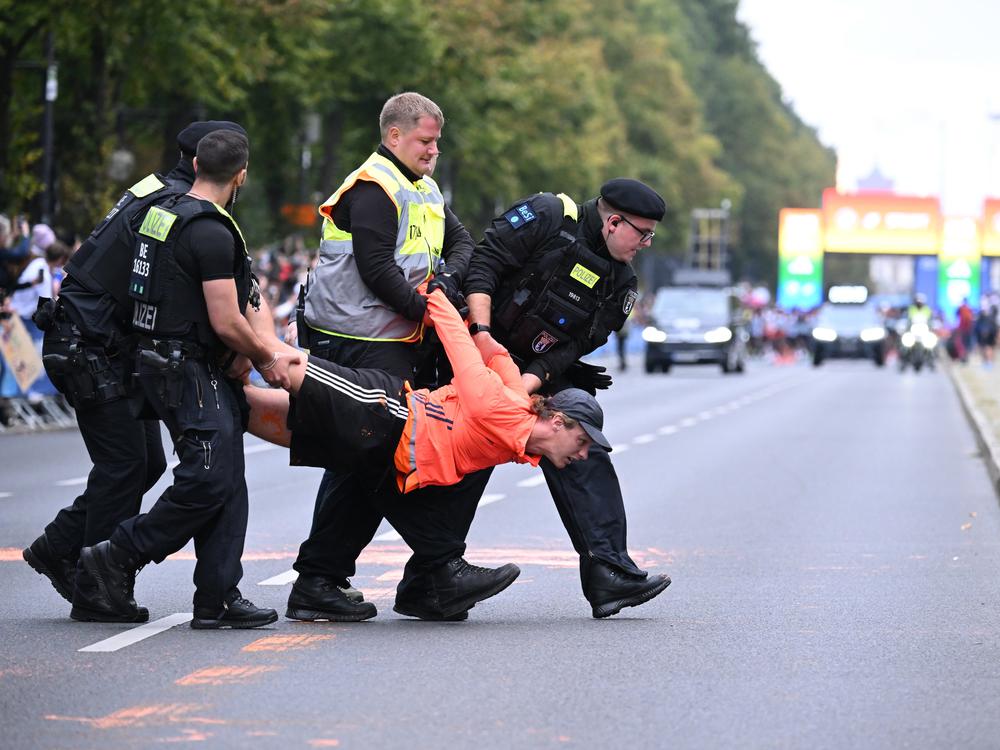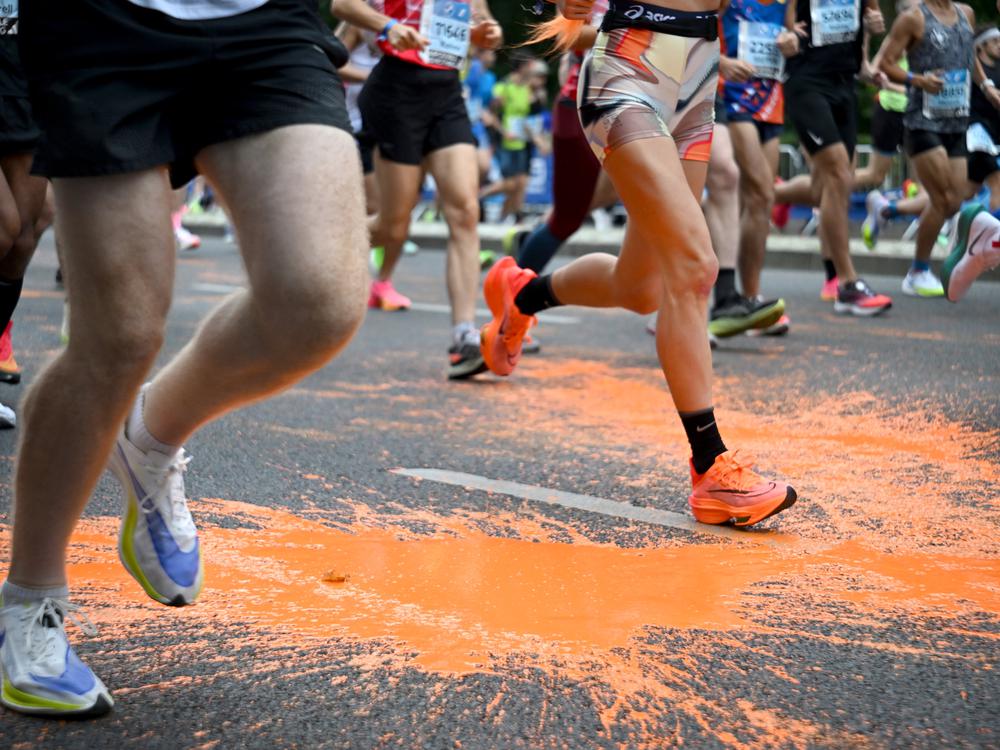The police arrests a climate activist shortly before the start of the Marathon (in the background). [All image sources: tagesspiegel.de]
Around 60,000 people from more than 150 countries took to the starting line last Sunday in late summer weather in the capital to follow in the footsteps of the Greek legendary heroes under the banners of car monopoly BMW and cross the finish line through the landmark of German imperialism after running over 42 kilometres.
Once again, a new world record was set at the world's fastest marathon - Ethiopian woman Tigist Assefa ran the course in 2:11:53 hours; in the men's race, last year's Kenyan winner Eliud Kipchoge missed his world record of 2:01:09 hours set there by 93 seconds. The biggest winner, however, was already clear in advance: the repressive apparatus of the federal state of Berlin, which was able to create another template for assembly bans in the future. The climate activists of the "Last Generation", who had sprayed the Brandenburg Gate with orange paint only a week before, had announced in advance that they would block the marathon. As a result, the Berlin police issued a general order on 22 September prohibiting unregistered actions and demonstrations "by the group 'Last Generation'" around the marathon and on the city motorway. Penalties of 2000 euros were announced for violations. The justification for all this can be found further down in the text:
"Assemblies within the meaning of Article 8 of the Basic Law (GG) are local gatherings of several persons for joint discussions or rallies aimed at participating in the formation of public opinion (BverfG, decision of 24 October 2001 - 1 BvR 1190/90 -, juris marginal no. 41). This is the case with blockade actions if they are carried out with the aim of influencing the formation of public opinion and if intended disturbances serve as a means of symbolic support for their protest, which is subordinate to the purpose of communication, and thus serve to strengthen the communicative effect in the public (compare BVerfG, decision of 24 October 2001 - 1 BvR 1190/90 -, juris marginal no. 42).
On the other hand, blockades do not fall within the scope of protection of the freedom of assembly if the blockade does not primarily serve to express an opinion or to attract public attention for a communicative concern, but to enforce one's own demands by force or otherwise in a self-help-like manner (cf. BVerfG, Order of 24 October 2001 - 1 BvR 1190/90 -, juris marginal no. 43f.).
The latter could well be assumed in the case of the actions of the "Last Generation". The blockades do not ostensibly serve the symbolic support of the political concern to take measures against climate change. Rather, concrete demands (introduction of a "9-Euro-Ticket" and a speed limit of 100 km/h) are associated with the blockade actions. The end of the long-term waves of action is precisely to be made dependent on these concrete political demands being met. In this respect, the blockades also serve to enforce the demands in a self-help-like manner. The blockade actions are not aimed at convincing broad sections of society of the demands and realising the demands within the framework of a democratic process. In the end, the "Last Generation" is much more concerned with taking the urban society into "hostage" with the blockades [...]" (emphasis ours)
With such far-fetched justifications, the executive is carrying out an unhindered attack on the right to freedom of assembly. The police's solo action serves as a template for later assembly bans, and would not have been possible now without the persistent reactionary propaganda and opinion-making of large sections of the bourgeois press against the "Klima-Kleber".
On Sunday, these were ready on time for the start on the Street of 17 June to bring the marathon to a standstill. The western part of the Prussian boulevard had to swallow a bit of orange paint, but the attempted blockades in the shadow of the Victory Column were immediately prevented by the police. There were 31 arrests, and yet the police were able to exploit the event as a PR event. Because there is applause from many sides for clearing away climate activists. The pacifist actions are unpopular among the majority of the masses because they affect mainly workers and - unlike a general strike, for example - do not achieve any improvement for anyone in the process, because there is no fighting but "civil disobedience". The countless young people, whose courage and will to fight, whose willingness to make sacrifices, even to go to jail for the just cause, etc., is scared away by the heads of the movement preaching trust in bourgeois democracy and timid demands on the government in the fight against the "climate crisis", a side contradiction of imperialism (and certainly of socialism for a long time to come), were on this Sunday the purpose of sanctifying progress in the reactionarisation of the state.
The fact that there is a growing gap between the Green Party led mass movement in the base and the party leadership was shown by the statements of the party's parliamentary group leaders in the Berlin parliament, Bettina Jarasch and Werner Graf: "We don't believe that anyone will be convinced of more climate protection if people moving through the city on foot are obstructed". Even though one rarely hears such suave formulations from Green Party leaders, it shows how big problems they have in retaining their supporters. Thus, the state can tighten the chains a little by means of restrictive general decrees, but at the same time the political crisis of German imperialism is deepening.
|
The marathon moves away over the rests of the colour attack |
The winners: Tigist Assefa and Eliud Kipchoge |













